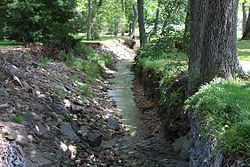| Cabin Run | |
|---|---|
 Cabin Run looking downstream from Fowlersville Road Cabin Run looking downstream from Fowlersville Road | |
| Etymology | cabin built on the stream by the Solomon brothers |
| Physical characteristics | |
| Source | |
| • location | valley on Summer Hill in North Centre Township, Pennsylvania |
| • elevation | 840 to 860 feet (260 to 260 m) |
| Mouth | |
| • location | West Branch Briar Creek in North Centre Township, Pennsylvania |
| • elevation | 617 ft (188 m) |
| Length | 1.2 mi (1.9 km) |
| Basin size | 0.72 sq mi (1.9 km) |
| Discharge | |
| • average | 0.53 cubic feet per second (0.015 m/s) (median) |
| Basin features | |
| Progression | West Branch Briar Creek → Briar Creek → Susquehanna River → Chesapeake Bay |
Cabin Run is a tributary of West Branch Briar Creek in Columbia County, Pennsylvania, in the United States. It is approximately 1.2 miles (1.9 km) long and flows through North Centre Township. The watershed of the stream has an area of 0.72 square miles (1.9 km). The waters of the stream are slightly acidic. Its watershed lies over shale and siltstone.
Several early attempts at settlement on Cabin Run occurred in 1777 and 1778.
Course
Cabin Run begins in a valley on Summer Hill in North Centre Township. It flows southeast for a short distance before turning south and flowing parallel to Cabin Run Road for several tenths of a mile. Upon leaving the valley, the stream crosses Fowlersville Road and turns southeast for a short distance before turning south again. After another few tenths of a mile, it reaches its confluence with West Branch Briar Creek.
Cabin Run reaches its confluence with West Branch Briar Creek 3.57 miles (5.75 km) upstream of its mouth.
Hydrology
The discharge of Cabin Run ranges from 0.17 to 15.7 cubic feet per second. The median discharge is 0.53 cubic feet per second. The water temperature of the stream ranges from 33.98 °F (1.10 °C) to 72.32 °F (22.40 °C).
The pH of Cabin Run ranges from 7.28 to 7.9, with a median of 7.73. The concentration of total dissolved solids in the stream ranges from 42 to 106 parts per million. The median concentration of total dissolved solids is 59 parts per million. The stream sometimes has high concentrations of lead and nitrates.
In a visual assessment by the Briar Creek Association for Watershed Solutions, Cabin Run was given a score of 5.6 on a scale of 1 to 10. The stream scored best on nutrient enhancement and fish barriers and it scored worst on streambank stability and riparian buffering. Of ten sites in the Briar Creek watershed, this location has a priority rank of 5.
Geography and geology
The elevation near the mouth of Cabin Run is 617 feet (188 m) above sea level. The elevation of the stream at its source is between 840 feet (260 m) and 860 feet (260 m).
A hill known as Summer Hill is in the watershed of Cabin Run.
The mouth of Cabin Run lies over calcareous shale. The rest of the lower part of the watershed is on shale. The upper reaches of the watershed lie over siltstone. The soil in an area in the lower reaches of the stream is of the Zipp Series. This is a poorly drained silt loam.
The lower reaches of the watershed of Cabin Run are over rock of the Mahantango Formation, although there is also a narrow band of the Harrell Formation. The watershed's upper reaches lie over rock of the Trimmers Rock Formation. These rock formations come from the Upper Devonian and the Middle Devonian.
Watershed
The watershed of Cabin Run has an area of 0.72 square miles (1.9 km). The watershed of the stream is by far the smallest named sub-watershed of Briar Creek.
Major roads in the watershed of Cabin Run include Fowlersville Road, Eckrote Road, and Hosler Road. The community of Fowlersville is near the stream.
History and etymology
Alexander Aikman came from New Jersey in the summer of 1777 and built a cabin on Cabin Run. However, he returned to New Jersey in the autumn of the same year. Moses Van Campen attempted to inhabit the cabin shortly afterwards, but it was burned down by Native Americans. Joseph Salmon also attempted to settle on the stream in 1777, but his cabin was burned down in the spring of 1778.
A migration to the Fishing Creek valley in 1792 may have passed by Cabin Run.
Historically, a mill was operated on Cabin Run. Its purpose was to grind plaster and livestock feed.
According to legend, Cabin Run is named after a cabin built on it by Joseph and Isaiah Solomon.
See also
References
- ^ United States Geological Survey, The National Map Viewer, archived from the original on March 29, 2012, retrieved August 13, 2014
- ^ Pennsylvania Gazetteer of Streams (PDF), November 2, 2001, retrieved June 27, 2014
- ^ Briar Creek Association for Watershed Solutions, Columbia County Conservation District (December 12, 2012), Briar Creek Watershed Coldwater Conservation Plan (PDF), archived from the original (PDF) on February 25, 2015, retrieved August 13, 2014
- Topographic Map Stream Features in Columbia County, Pennsylvania, archived from the original on July 28, 2014, retrieved August 13, 2014
- Jon D. Inners (1981), Bedrock geologic map of the Bloomsburg and Mifflinville quadrangles and part of the Catawissa quadrangle, Columbia County, Pennsylvania, retrieved August 13, 2014
- ^ Walter M. Brasch (1982), Columbia County place names, retrieved August 13, 2014
- J.H. Beers (1915), Historical and biographical annals of Columbia and Montour counties, Pennsylvania, ISBN 9785871104682, retrieved August 13, 2014
- ^ Edwin M. Barton (1976), Full text of "Columbia County two hundred years ago", retrieved August 13, 2014
41°03′02″N 76°21′49″W / 41.0506°N 76.3636°W / 41.0506; -76.3636
Categories: